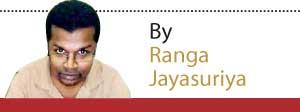How the government ‘ended’ racism in Sri Lanka
President Gotabaya Rajapaksa meets the Tamil National Alliance leaders
30 March 2022
During these sweaty island nights punctured by power cuts, think about the missing bogeyman. Gotabaya Rajapaksa, the incumbent President swept to power promising to give the Sinhala Buddhist constituency their rightful place, which it was implied as being undermined by sinister scheming by ethnic minorities. Muslim eateries were accused of surreptitiously lacing their food with chemical substances that would sterile the Sinhalese men/women. A Muslim doctor was charged with conducting tubal sterilization procedures on unsuspecting Sinhalese Buddhist women. He spent time in prison and remained suspended from service, long after his alleged victims had babies. An acolyte of the president, Channa Jayasumana, a professor who fed into that racist witch-hunting was elected to Parliament and became a Minister. 
Gotabaya Rajapaksa campaigned to protect the Sinhalese from an imaginary bogeyman, that his spin-doctors and racist underlings cultivated through the skilful use of social media and mainstream media.
"Last week, the President met the TNA delegation. Among the matters discussed were tapping into the foreign direct investment by Tamil diaspora, and to end, the possibility of de-proscribing a series of diaspora Tamil organizations. Those groups were earlier unbanned by the Yahapalanaya government but were banned again by the incumbent president"
People voted for him so that they would have a ‘country to live (Inna hitinna ratak) as if the country did not exist before. First thing in the office, he dropped the Tamil version of the national anthem in his swearing-in ceremony and set off to give the Sinhalese Buddhists their ‘rightful place.’ He crowed about that he was elected solely by the Sinhalese Buddhist votes, though he promised to be the president of all communities.
But, then, his government resorted to the compulsory cremation of Muslim covid dead, a sacrilege for the dead in the Islamic belief, against the guidelines of the WHO and advice of established health professionals. Despite the early success of tackling the pandemic, the government made the headlines for the wrong reasons. There were far more sinister schemes to restructure the state and electoral system in a way to reduce the impact of the ethnic minority votes was plotted by the fellow travellers and ideologues in his political camp.
Then the economic crisis, worsened by mismanagement and criminal negligence struck the country. As the basic essentials got scarcer and pricier and the nation is plunged into regular power cuts, the once familiar panorama of racist dog-whistling ran out of steam.
"Then the economic crisis, worsened by mismanagement and criminal negligence struck the country. As the basic essentials got scarcer and pricier and the nation is plunged into regular power cuts, the once familiar panorama of racist dog-whistling ran out of steam"
A vast swathe of an otherwise gentle local constituency that believed in the racist exclusivism of Gotabaya Rajapaksa, now spent a good part of their day in long queues. The farmers, who overwhelmingly voted for Rajapaksa had their livelihood decimated by the presidential ban on chemical fertilizer. Fishing communities are sharpening their knives. The fuel shortage has prevented them from going to the sea.
Even the borderline racists of the Rajapaksa camp had jumped the ship, or were kicked out by the president himself, and are accusing the president and his sibling Basil Rajapaksa of the ruin of the nation. The Rajapaksas, the skilful and sinister users of conspiracy theories are now being labelled as ugly Americans. The president’s once devoted Sinhala Buddhist voters are among the loudest, calling for him to go home.
In the meanwhile, a new sense of pluralism has dawned on the president. Last week, he met with a delegation of the Tamil National Alliance (TNA). Among the matters discussed were tapping into the foreign direct investment by Tamil diaspora, and to end, the possibility of de-proscribing a series of diaspora Tamil organizations. Those groups were earlier unbanned by the Yahapalanaya government but were banned again by the
incumbent president.
The government has amended the much-abused Prevention of Terrorism Act (PTA) to placate the EU and save the GSP Plus trade concessions. Elsewhere a national consensus is evolving for revoking the PTA altogether, among the advocates are the main Opposition Samagi Jana Balavegaya, of which leader Sajith Premadasa once wanted the Yahapalanaya government to halt the reforms into the draconian law.
"Even the borderline racists of the Rajapaksa camp had jumped the ship, or were kicked out by the president himself, and are accusing the president and his sibling Basil Rajapaksa of the ruin of the nation. The Rajapaksas, the skilful and sinister users of conspiracy theories are now being labelled as ugly Americans"
In some parts of the world, economic hardships tend to widen ethnic fault lines. The East Asian economic crisis that toppled the three decades of iron-clad rule of Suharto in Indonesia was also punctured by ethnic riots that targeted the well-to-do Chinese community.
In Sri Lanka, the economic crisis had narrowed these differences. It had not discriminated against any community. Sinhalese, Tamils and Muslims all alike are victims of criminal mismanagement of what could have been a manageable crisis. They all loath a microscopic minority of regime affiliated rent-seekers who milk the nation at its weakest hour.
No amount of racist dog-whistling can remedy the loathing towards
the government.
Strangely, the economic crisis has brought the disparate communities together. If the government had free reign, the strains on the nation’s fabric would have been a lot worse than dried fuel pumps at service stations. Perhaps, that is the silver line in these dark nights.
Follow @RangaJayasuriya
on Twitter


No comments:
Post a Comment
Note: only a member of this blog may post a comment.